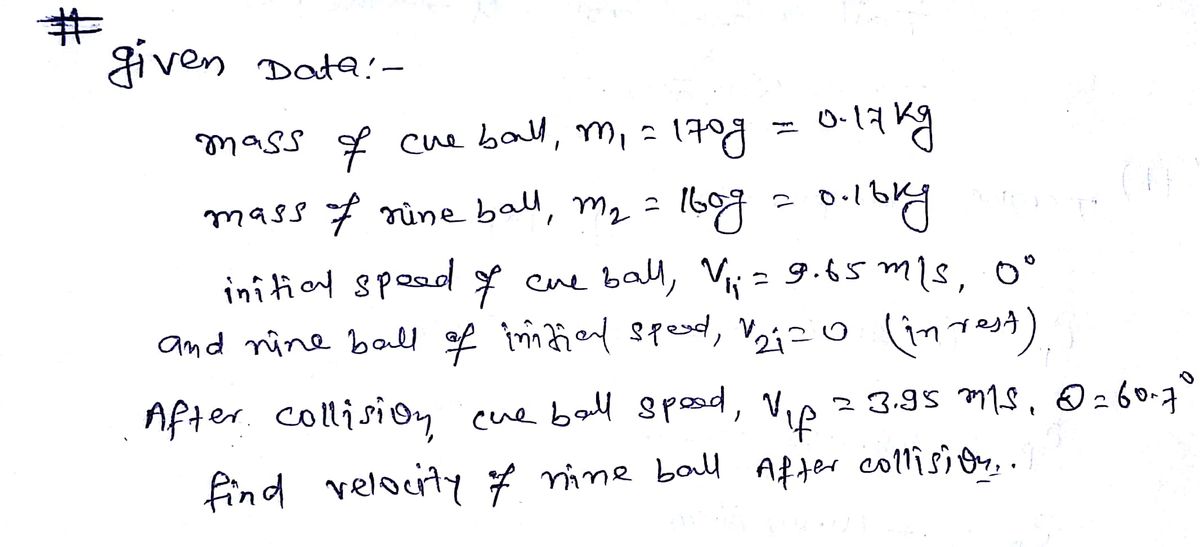The equation a = Fnet / m is valid in any dimension. That is, a = Fnet / m implies ax = Fnet x / m and ay = Fnet y / m. Similarly, the law of conservation of momentum is valid in any dimension. pA0 + pB0 = pA + pB implies pA0x + pB0x = pAx + pBx and pA0y + pB0y = pAy + pBy. Standard cue balls have masses of 170 grams, while numbered billiard balls have masses of only 160 grams. A cue ball traveling at 9.65 meters per second and 0.0 degrees strikes the nine ball at rest. After the collision, the cue ball travels at 3.95 meters per second and 60.7 degrees. What is the velocity of the nine ball after the collision? Include units in your answers.
The equation a = Fnet / m is valid in any dimension. That is, a = Fnet / m implies ax = Fnet x / m and ay = Fnet y / m. Similarly, the law of conservation of momentum is valid in any dimension. pA0 + pB0 = pA + pB implies pA0x + pB0x = pAx + pBx and pA0y + pB0y = pAy + pBy. Standard cue balls have masses of 170 grams, while numbered billiard balls have masses of only 160 grams. A cue ball traveling at 9.65 meters per second and 0.0 degrees strikes the nine ball at rest. After the collision, the cue ball travels at 3.95 meters per second and 60.7 degrees. What is the velocity of the nine ball after the collision? Include units in your answers.
College Physics
11th Edition
ISBN:9781305952300
Author:Raymond A. Serway, Chris Vuille
Publisher:Raymond A. Serway, Chris Vuille
Chapter1: Units, Trigonometry. And Vectors
Section: Chapter Questions
Problem 1CQ: Estimate the order of magnitude of the length, in meters, of each of the following; (a) a mouse, (b)...
Related questions
Question
The equation a = Fnet / m is valid in any dimension. That is, a = Fnet / m implies ax = Fnet x / m and ay = Fnet y / m. Similarly, the law of conservation of momentum is valid in any dimension. pA0 + pB0 = pA + pB implies pA0x + pB0x = pAx + pBx and pA0y + pB0y = pAy + pBy.
Standard cue balls have masses of 170 grams, while numbered billiard balls have masses of only 160 grams. A cue ball traveling at 9.65 meters per second and 0.0 degrees strikes the nine ball at rest. After the collision, the cue ball travels at 3.95 meters per second and 60.7 degrees. What is the velocity of the nine ball after the collision? Include units in your answers.

Transcribed Image Text:The equation a = Fnet/m is valid in any dimension. That is, a = Fnet/m implies ax = Fnet x/m and ay Fnet y/m. Similarly, the law of conservation of momentum is valid in any dimension. PÃO +
PBO = PA + PB implies PAOX + PBOX = PAX + PBX and PAOy + PB0y = PAY + PBY-
Standard cue balls have masses of 170 grams, while numbered billiard balls have masses of only 160 grams. A cue ball traveling at 9.65 meters per second and 0.0 degrees strikes the nine ball at
rest. After the collision, the cue ball travels at 3.95 meters per second and 60.7 degrees. What is the velocity of the nine ball after the collision? Include units in your answers.
4.0
N
at 4.0
IS
(referenced to east being 0°, all angles between 0° and 360°)
Expert Solution
Step 1

Step by step
Solved in 3 steps with 3 images

Knowledge Booster
Learn more about
Need a deep-dive on the concept behind this application? Look no further. Learn more about this topic, physics and related others by exploring similar questions and additional content below.Recommended textbooks for you

College Physics
Physics
ISBN:
9781305952300
Author:
Raymond A. Serway, Chris Vuille
Publisher:
Cengage Learning

University Physics (14th Edition)
Physics
ISBN:
9780133969290
Author:
Hugh D. Young, Roger A. Freedman
Publisher:
PEARSON

Introduction To Quantum Mechanics
Physics
ISBN:
9781107189638
Author:
Griffiths, David J., Schroeter, Darrell F.
Publisher:
Cambridge University Press

College Physics
Physics
ISBN:
9781305952300
Author:
Raymond A. Serway, Chris Vuille
Publisher:
Cengage Learning

University Physics (14th Edition)
Physics
ISBN:
9780133969290
Author:
Hugh D. Young, Roger A. Freedman
Publisher:
PEARSON

Introduction To Quantum Mechanics
Physics
ISBN:
9781107189638
Author:
Griffiths, David J., Schroeter, Darrell F.
Publisher:
Cambridge University Press

Physics for Scientists and Engineers
Physics
ISBN:
9781337553278
Author:
Raymond A. Serway, John W. Jewett
Publisher:
Cengage Learning

Lecture- Tutorials for Introductory Astronomy
Physics
ISBN:
9780321820464
Author:
Edward E. Prather, Tim P. Slater, Jeff P. Adams, Gina Brissenden
Publisher:
Addison-Wesley

College Physics: A Strategic Approach (4th Editio…
Physics
ISBN:
9780134609034
Author:
Randall D. Knight (Professor Emeritus), Brian Jones, Stuart Field
Publisher:
PEARSON